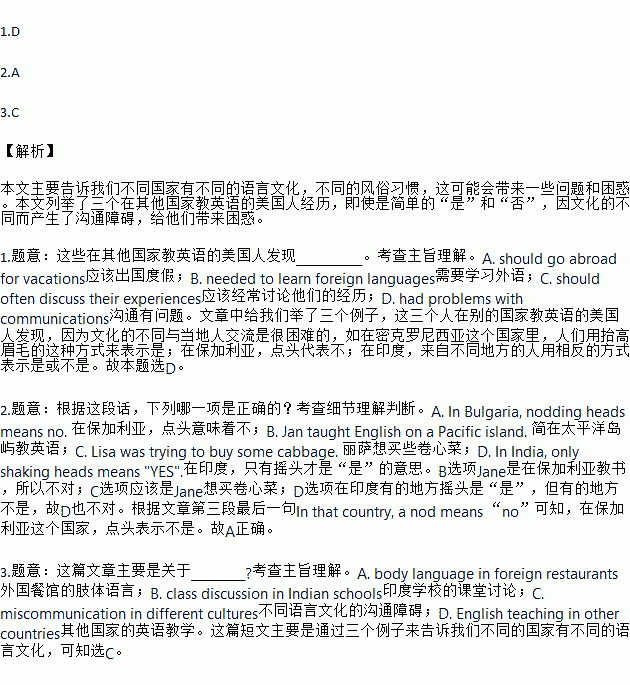题目内容
Living in a foreign culture can be exciting, but it can also be confusing (令人迷惑的). A group of Americans who taught English in other countries recently discussed their experiences. They decided that miscommunications(沟通障碍) were always possible, even over something as simple as "yes" and "no".
On her first day in Micronesia, an island in the Pacific, Lisa thought people weren't paying any attention to her. The day was hot. She went into a store and asked, "Do you have cold drinks?" The woman there didn't say anything. Lisa repeated the question. Still the woman said nothing. She later learned that the woman had answered her: She had raised her eyebrows (眉毛), which in Micronesia means "yes".
Jan remembered an experience she had in Bulgaria, a country in Europe. She went to a restaurant that was known for its cabbage. She asked the waiter, "Do you have cabbage today?" He nodded his head. Jan waited, but the cabbage never came. In that country, a nod means “no”.
Tom had a similar problem when he arrived in India. After explaining something in class, he asked his students if they understood. They answered with many different nods and shakes of the head. He thought some people had not understood, so he explained again. When he asked again, they did the same thing. He soon found out that his students did understand. In India, people nod and shake their heads in different ways depending on where they come from. You have to know where a person is from to understand whether they mean "yes" or "no".
1.These Americans teaching English in other countries found that they ______.
A. should go abroad for vacations B. needed to learn foreign languages
C. should often discuss their experiences D. had problems with communications
2.Which of the following is TRUE according to (根据) this passage?
A. In Bulgaria, nodding heads means no. B. Jan taught English on a Pacific island.
C. Lisa was trying to buy some cabbage. D. In India, only shaking heads means "YES".
3.The passage is mainly about .
A. body language in foreign restaurants B. class discussion in Indian schools
C. miscommunication in different cultures D. English teaching in other countries
书面表达
这些年来,我们的生活在多方面发生了巨大变化。对比过去和现在,根据以下内容写一篇题为“Past and present”的短文。
要求:1、必须包括表格中所有的相关信息,并适当发挥。2、词数:90词左右。
阅读 | 旅游 | 环境 | |
过去 | 空闲时间看电视,阅读纸质书。 | 骑车,坐公交车或火车旅游。 | 马路又窄又脏,到处是垃圾。 |
现在 | 大部分家庭有电脑,在网上阅读报纸、杂志。 | 乘飞机出国旅行,甚至通过网上旅游,不带护照(passport)周游世界。 | 宽阔干净的街道,两边都是绿色的树。政府在大的空地上建起了高楼。 |
感受 | ……(自拟1-2点) |
Past and present
_____________________________________________________________________________
_____________________________________________________________________________

